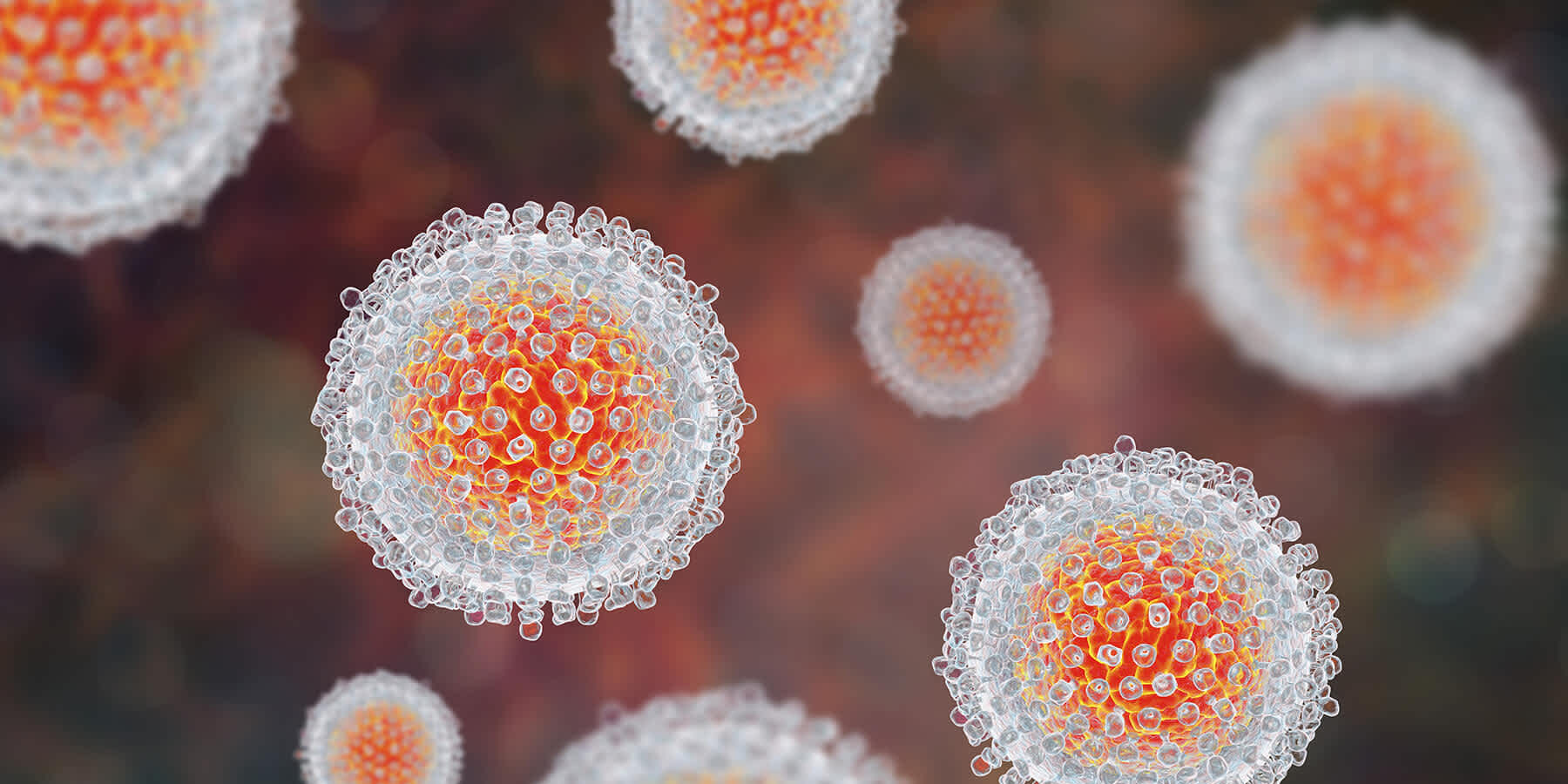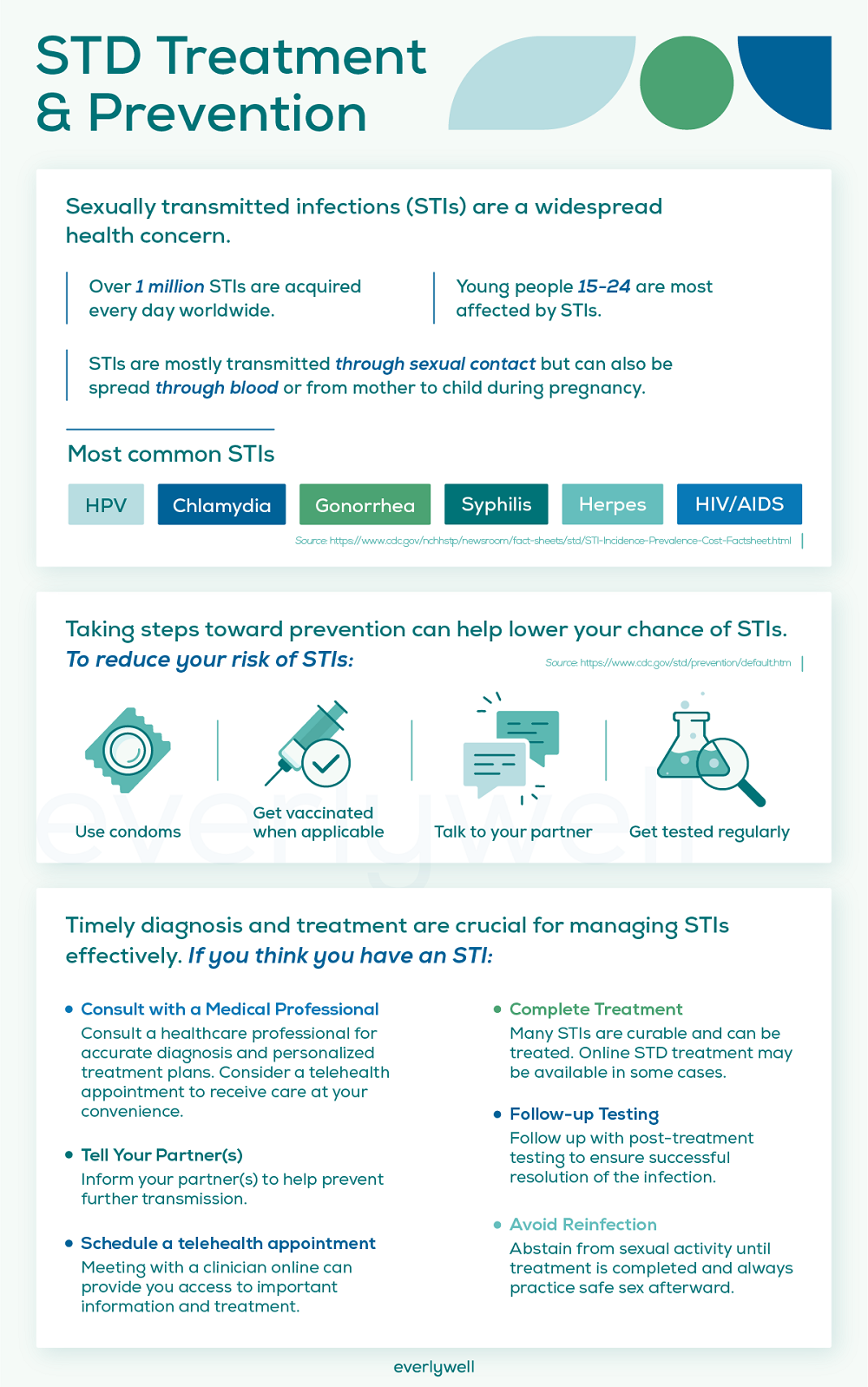
How to cure STDs without going to the doctor
Written on February 3, 2023 by Sendra Yang, PharmD, MBA. To give you technically accurate, evidence-based information, content published on the Everlywell blog is reviewed by credentialed professionals with expertise in medical and bioscience fields.
Table of contents
- What are STDs?
- Symptoms of STDs
- Testing, treatment, and management of STDs
- Can STDs be cured without going to see a healthcare provider?
- Telehealth and testing with Everlywell
- Related content
What are STDs?
Sexually transmitted diseases (STDs), also known as sexually transmitted infections (STIs), refer to conditions that develop from an infection passed from one person to another through sexual contact, including vaginal, oral, or anal. [1,2] Various pathogens, such as bacteria, viruses, or parasites, cause several types of STDs. [1,2] The different types of STDs include:
- Chlamydia
- Gonorrhea
- Viral hepatitis
- Herpes
- Human immunodeficiency virus (HIV)
- Human papillomavirus (HPV)
- Mycoplasma genitalium (Mgen)
- Syphilis
- Trichomoniasis
Preliminary STD surveillance data from the Centers for Disease Control and Prevention (CDC) show 2.5 million reported cases of chlamydia, gonorrhea, and syphilis in 2021. [3] The large number of reported cases serves as a reminder that STDs remain a significant public health issue.
Symptoms of STDs
Many kinds of sexually transmitted infections have very mild to no symptoms. [1,4] Therefore, it is possible for someone to have an STD and unknowingly pass the infection to others. [2] If left untreated, some STDs can lead to severe complications and may even become life-threatening, depending on the type of infection. If you do experience symptoms, they may include: [4]
- Bumps or sores near the penis, vagina, mouth, or anus
- Swelling and redness or severe itching near the penis or vagina
- Discharge from the penis or vagina that may have a foul odor and cause irritation
- Abnormal vaginal bleeding
- Painful sex
- Skin rash
- Weight loss, diarrhea, or night sweats
- Aches, pains, fever, and chills
- Jaundice
- Painful or frequent urination
Testing, treatment, and management of STDs

The CDC has a number of recommended screenings that you should undergo regularly to get tested for sexually transmitted infections—this is still very important even if you are asymptomatic. [2] Many STDs are easily diagnosed with the appropriate testing. A healthcare provider can help recommend the right testing for you, based on your symptoms, potential exposure, and medical history.
The different types of STDs are treated or managed differently based on the pathogen responsible for the infection. [1] Some STDs are curable with appropriate treatment, while some do not have cures and are only managed with available therapies. Gonorrhea, chlamydia, and syphilis are common STDs that are frequently curable, while herpes, HIV, and HPV currently do not have cures. [1,5]
Antibiotics, antifungals, and antivirals are classes of medications used to treat, manage, or cure the different types of STDs. [1,5] These drugs require a prescription from a healthcare provider before you can get them. Getting the proper diagnosis, treatment, counseling, and follow-up is crucial if you have an infection. [1] To avoid reinfection, your partner(s) should also visit a healthcare provider to get appropriate treatment. Though various alternative therapies, such as naturopathy, homeopathy, and herbal medicines, are sometimes used to help manage STDs, more research is needed to evaluate these approaches. [6] It is generally not recommended by healthcare providers to use these alternative therapies because of the lack of evidence of their efficacy. [1]
Can STDs be cured without going to see a healthcare provider?
For many, there can be anxiety, scheduling issues, cost concerns, or other barriers to seeing a healthcare provider in person to seek STI treatment. Given how common sexually transmitted infections are, there are a few ways you may be able to get proper STI treatment without visiting a healthcare provider in person. Remember, STDs can only be cured by using the appropriate treatment.
Some things you can consider doing if you suspect you have a sexually transmitted infection without going to see a provider in their office include: using telehealth to see a healthcare provider virtually, and taking advantage of at-home STD lab testing.
Telehealth
The availability of telemedicine or telehealth allows you to virtually schedule an appointment to discuss STD testing, treatment, and management online with a healthcare provider from the comfort of your own home. Telehealth may be an option for you if you have been exposed to an STD or have mild symptoms. These symptoms include painful urination, pelvic pain, pain during sex, unusual penile or vaginal discharge, or abnormal vaginal odor. [4]
You will need to get the appropriate recommended treatment for curable STDs to become cured. Based on the CDC treatment guidelines treatments are based on the specific pathogen responsible for the infection. [1] Each sexually transmitted infection has treatment and management recommendations. The antibiotic, antiviral, or antifungal used for the treatment of the STD requires a prescription from a healthcare provider. Through telehealth, a healthcare provider can recommend appropriate STD testing or prescribe STD treatment if a diagnosis is confirmed.
At-home lab testing
Stopping the transmission of STDs and getting appropriate treatment starts with knowing your STD status. [1,7] Testing for STDs is an initial step to understanding whether you have contracted a sexually transmitted infection. Once you know your status, you can then work with a healthcare provider either digitally or in-person to go through the next steps that are right for you, which could include treatment. These days, you can get at-home lab tests which allow you to collect your sample in the comfort of your own home. Research indicates that at-home lab tests for STDs are accurate, and also lead to increases in diagnosis rates (likely because of the convenience and privacy, so more people take them). [8]
Prevention
Prevention is key to limiting your chances of getting infected with STDs. [1,7] The CDC recommends a few ways to protect yourself and your sexual partners, such as abstinence, reducing the number of sex partners, mutual monogamy, and using barrier methods such as condoms. [7] You can implement these prevention strategies at home without ever seeing a healthcare provider in person. Another recommendation is getting vaccines or starting certain prophylactic medicines (such as PrEP) that are available to help in protecting against some specific kinds of sexually transmitted infections. It's best to ask your healthcare provider which vaccines or prophylactic medicines may be right for you.
Telehealth and testing with Everlywell
We at Everlywell offer access to virtual care visits for online STD treatment. Virtual care visits allow you to schedule a time to meet with a certified healthcare provider to discuss potential STD symptoms or exposure. The healthcare provider will give you a detailed care plan following your visit, which may include additional testing or prescription medication, if appropriate.
Everlywell also offers STD at-home lab tests. Tests are discreetly shipped to your door, and you receive results in days. If results are abnormal, a board-certified physician will contact you to discuss your results and may prescribe treatment.
Related content
What to know about STD treatment online
Can I get help with my sleeping problems online?
Can you get rid of a UTI naturally?
References
- Workowski KA, Bachmann LH, Chan PA, et al. Sexually transmitted infections treatment guidelines, 2021. MMWR Recomm Rep. 2021;70(4):1-187. doi: 10.15585/mmwr.rr7004a1.
- CDC - STD Diseases & Related Conditions. Centers for Disease Control and Prevention. URL. Published October 18, 2022. Accessed January 25, 2023.
- Preliminary 2021 STD surveillance data. Centers for Disease Control and Prevention. URL. Published September 1, 2022. Accessed January 26, 2023.
- Sexually transmitted diseases: Symptoms, diagnosis & treatment. Cleveland Clinic. URL. Accessed January 25, 2023.
- Public knowledge and attitudes about sexually transmitted infections: KFF polling and Policy Insights. KFF. URL. Published April 13, 2021. Accessed January 25, 2023.
- Vermani K, Garg S. Herbal medicines for sexually transmitted diseases and AIDS. J Ethnopharmacol. 2002;80(1):49-66. doi: 10.1016/s0378-8741(02)00009-0. URL.
- Prevention - STD information from CDC. Centers for Disease Control and Prevention. URL. Published March 23, 2022. Accessed January 26, 2023.
- Beeston A. Self-tests for STIs increase diagnoses and reduce costs. NIHR Evidence. URL. Published August 17, 2022. Accessed January 26, 2023.